July 1913
| << | July 1913 | >> | ||||
|---|---|---|---|---|---|---|
| Su | Mo | Tu | We | Th | Fr | Sa |
| 1 | 2 | 3 | 4 | 5 | ||
| 6 | 7 | 8 | 9 | 10 | 11 | 12 |
| 13 | 14 | 15 | 16 | 17 | 18 | 19 |
| 20 | 21 | 22 | 23 | 24 | 25 | 26 |
| 27 | 28 | 29 | 30 | 31 | ||
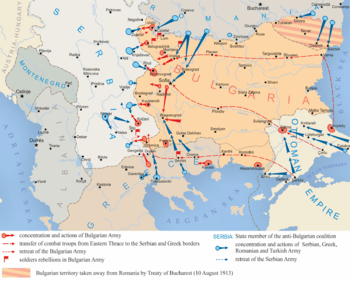
July 11 and July 12, 1913: Romania and Turkey invade Bulgaria, which was already fighting the Second Balkan War with Greece and Serbia

July 4, 1913: Bulgarians defeated at Battle of Kilkis
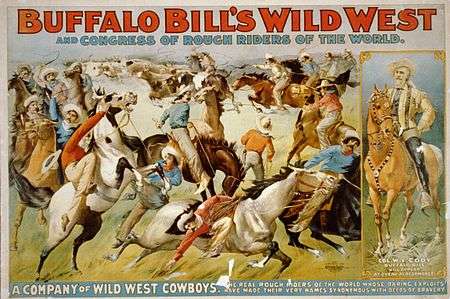
July 23, 1913: Bankruptcy auction brigns end to Buffalo Bill's Wild West Show
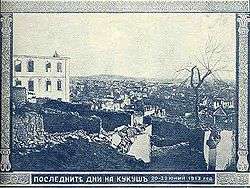
the ruins of Kilkis
The following events occurred in July 1913:
July 1, 1913 (Tuesday)
- Gettysburg reunion: more than fifty thousand (53,407)[1] surviving veterans of the Union and Confederate armies assembled at Gettysburg, Pennsylvania to set up tents and to commemorate the fiftieth anniversary of the Battle of Gettysburg.[2] Eight of the aged veterans had died by the time President Wilson's speech to the gathering.[3] The reunion ended on July 6.[4][5]
- Vilhjalmur Stefansson set off from Seattle for a three and a half year exploration of the area between Alaska and the North Pole.[6]
- American jewelers began the use of the metric carat as the standard for weighing of gemstones and pearls, with a carat being equal to 200 milligrams. The unit was slightly less than the English carat of 205.3035 milligrams.[7]
- The city of Millville, Florida was incorporated.[8]
- Died: Henri Rochefort, 82, French journalist and activist
July 2, 1913 (Wednesday)

David Lamar
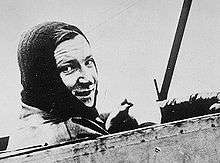
Brindejonc des Moulinais
- Wall Street lobbyist and con man David Lamar testified before a U.S. Senate subcommittee that he had frequently impersonated Congressmen during telephone conversations in order to gain an advantage.[9] The U.S. Department of Justice reluctantly concluded that there was no federal law under which Lamar could be prosecuted.[10] Although federal law made it a felony "to impersonate an officer of the United States", the U.S. Supreme Court had ruled that members of Congress were "not officers of the United States, but of the particular States from which they come.[11]
- Upon recommendation of the city Board of Health, the city of Cincinnati seized control of eight ice plants whose workers had gone on strike during the hot summer. [12] The strike settled four days later.[13]
- The Crocker Land Expedition, on the ship Diana, departed from New York City toward the North Pole for a three-year exploration project.[14]
- French aviator Marcel Brindejonc des Moulinais set a new distance record for an airplane, flying 3,100 miles from Paris to Saint Petersburg.[5]
July 3, 1913 (Thursday)
- The fiftieth anniversary of "Pickett's Charge", turning point in the Battle of Gettysburg in the American Civil War, was re-enacted by the survivors of the original battle.[15]
- The Kingdom of Romania issued an order for mobilization of its armies in preparation of an invasion of Bulgaria.[16]
- Born: Dorothy Kilgallen, American journalist, and panelist on What's My Line?, in Chicago (died of drug overdose, 1965)
July 4, 1913 (Friday)
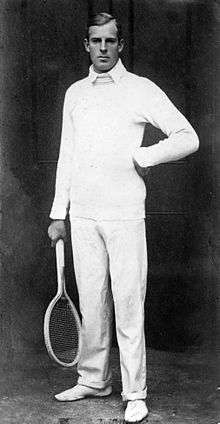
Tony Wilding
- Tony Wilding of England won his fourth consecutive All-England tennis championship, ending the hope of American Maurice McLoughlin to become the first foreigner to win the Wimbledon finals. Wilding overwhelmed McLoughlin in three straight sets, 8-6, 6-3 and 10-8.[17]
- The Russian village of Astradamovka, located in the Alatyr oblast (later the Ulyanovsk Oblast, was destroyed by a fire which killed 154 peasants.[18]
- Major General Erich von Falkenhayn was appointed as the new German Minister of War after General Josias von Heeringen resigned.[19]
- As the Second Balkan War continued, Greek and Serbian armies were successful in routing attacking Bulgarian troops, at Kılkış, which would later become part of Greek territory.[5]
- Died:
- Alfred Lyttelton, 56, British Secretary of State for the Colonies (1903–1905) and former cricketer
- Harry Knight, 23, American race car driver, along with his "mechanician" (mechanic), Milton McAllis, when their car blew a tire during a race in Columbus, Ohio and rolled over twice.[20]
July 5, 1913 (Saturday)
- Three days of rioting, by miners in the Rand District of South Africa, halted after the government agreed to bring legislation for improvement of working conditions. The night before, Johannesburg police had fired their guns into a crowd of protesters who ignored orders to disperse, killing 40.[21]
- Turkey announced that it would not intervene in the war against Bulgaria on the condition that Bulgaria relinquish its claims for indemnity from Turkey from the First Balkan War[5]
- The U.S. Post Office began the segregation of black postal clerks from white.[22]
July 6, 1913 (Sunday)
- English clergyman Henry Charles Beeching delivered what would become a widely republished sermon at the Norwich Cathedral in the British city of Norwich, describing the faith of the late George Borrow.[23]
- Born: Vance Trimble, American journalist and Pulitzer Prize winner (still alive in 2018)
- Died: J. C. Williamson, American-Australian actor and theatrical producer
July 7, 1913 (Monday)
- The Irish Home Rule bill passed on its third reading in the British House of Commons, 352-243.[24] The measure was sent to the House of Lords, which rejected it on July 15.
- Mexican-American folk hero and outlaw Gregorio Cortez was freed from the Texas State Penitentiary in Huntsville, Texas, where he had served eight and one half years, following a pardon issued by Governor Oscar Colquitt.[25]
- Born: Pinetop Perkins (Joseph William Perkins), American blues pianist, in Belzoni, Mississippi (d. 2011)
July 8, 1913 (Tuesday)

Curran, channeler of Worth

Ouija board
- Pearl Curran, a St. Louis housewife who was experimenting with a Ouija board, began reporting the communications of "Patience Worth", whom Curran said had been an Englishwoman who had lived in Dorset more than 200 years earlier, during the 17th century, and had been killed by Indians after crossing the ocean to America. For the next 24 years, until her death in 1937, Mrs. Curran would publish novels and poems attributed to her communications with Patience Worth,[26]
- Trainmen and conductors of most of the railroads in the eastern United States, voted 72,473 to 4,210 in favor of going on strike for higher wages, tying up the nation's commerce and travel.[27]
- The Welsh Disestablishment Bill passed its third reading in the House of Commons and was sent to the House of Lords for consideration.[5]
- Born: Walter Kerr, American writer and theater critic for the New York Times, in Evanston, Illinois (d. 1996)
- Died: Louis Hémon, 32, French-born novelist, after being struck by a train
July 9, 1913 (Wednesday)
July 10, 1913 (Thursday)
A cooler July day at Furnace Creek in 2005
- On the afternoon of July 10, 1913, the United States Weather Bureau recorded a high temperature of 134 °F (56.7 °C) at Greenland Ranch (now Furnace Creek) in Death Valley.[28] This temperature stands as the highest ambient air temperature ever recorded at the surface of the Earth. (A report of a temperature of 58 °C (136.4 °F) recorded in Libya in 1922 was later determined to be inaccurate.)[29]
- Born: Salvador Espriu, Spanish Catalanonian poet, in Santa Coloma de Farners (d. 1985)
- Died:
- Viscount Tadasu Hayashi, 63, former Japanese Foreign Minister, and ambassador from Japan to the United Kingdom.
- Burton E. Baker, 43, inventor and manufacturer of x-ray apparatus, from radiation sickness caused by his constant exposure to x-rays.[30]
July 11, 1913 (Friday)
- With the army of Bulgaria already engaged in a two-front fight with Greece and Serbia, troops from the Kingdom of Romania crossed the Danube river for its own invasion of Bulgaria.[31]
- Died: Redmond Berry, 47, Lord Chancellor of Ireland since 1911
July 12, 1913 (Saturday)
- The Jianxi province declared its independence from China, and the provincial assembly authorized Li Lieh-chun to lead a fight against the national government.[32]
- The day after Romania had invaded Bulgaria from the north, Turkey attacked from the south and moved into Thrace.[33]
- Albert Einstein was invited to become a member of the Prussian Academy of Sciences with Max Planck and Walther Nernst traveling to Zurich to make the offer in person. With the invitation came a full professorship at the Friedrich Wilhelm University in Berlin, with a high salary "without any teaching obligations", and the position of Director of the new Institute of Theoretical Physics of the Kaiser Wilhelm Society.[34]
- The historic Grove Park Inn opened in Asheville, North Carolina.[35]
- The Bethel Inn in Bethel, Maine opened to provide lodging and meals to the "out-patients" of Dr. John George Gehring[36]
- Born:
- Willis Lamb, American physicist and co-recipient of 1955 Nobel Prize in Physics, in Tucson, Arizona (d. 2008)
- Mildred Cohn, American biochemist and National Medal of Science recipient 1983, in New York City (d. 2009)
- Manohar Malgonkar, Indian author, in Jagalbet, British India (d. 2010)
July 13, 1913 (Sunday)
_(14782203995).jpg)
A photograph from Casement's report
- The final report by Roger Casement, on the atrocities of the British Peruvian Amazon Company against the indigenous people in its employ, was published by the British House of Commons.[37]
- French aviator Léon Letort set a new record for nonstop flight, exceeding 500 miles and finishing at 590 miles upon landing in Berlin after setting off from Paris nine hours earlier[38]
- Born:
- Mærsk Mc-Kinney Møller, Danish shipping magnate who founded the Maersk corporation; in Hellerup (d. 2012)
- Bryan Hextall, Canadian NHL player, 1969 inductee into the Hockey Hall of Fame; in Grenfell, Saskatchewan (d. 1984)
July 14, 1913 (Monday)
- A nationwide strike of railroad employees was averted by negotiations at the White House, which included President Wilson, Congressional leaders and the Secretary of Labor, as well as representatives of the railroads and the workers' unions. Management and labor settled their differences in light of an understanding that Congress would approve an amendment of the Erdman Arbitration Act. Passage of the bill and its signing into law were accomplished the next day.[39]
- The British House of Commons passed a bill abolishing plural voting, on the third reading, by a margin of 293-222.
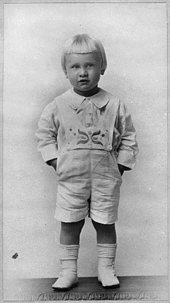
Future President Ford
- Leslie Lynch King, Jr. who would grow up to become the 38th President of the United States was born at his parents' home at 3202 Woolworth Avenue in Omaha, Nebraska, at 12:43 am local time to Dorothy Gardner King and Leslie Lynch King Sr.. After the Kings' divorce and the remarriage of Dorothy, Leslie, Jr., would be renamed Gerald Rudolph Ford.[40]
- Born: Magdalena Mondragón Aguirre, Mexican playwright, novelist, feminist and newspaper editor, in Torreón (d. 1988)[41] Gerald Ford, President of the United States of America
- Died: John Bannon, 83, Irish Catholic priest who served as a chaplain in the Confederate Army during the American Civil War.
July 15, 1913 (Tuesday)
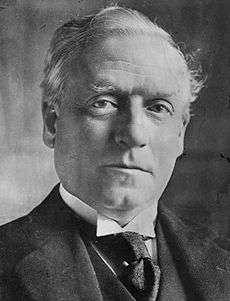
Prime Minister Asquith takes on the House of Lords
- As expected, Britain's House of Lords voted against approval of the Irish Home Rule bill, for the second time, by a majority of 238. Prime Minister H. H. Asquith announced that his government would present a plan for abolition of the House of Lords at the next session of Parliament.[42] The bill would finally become law on September 18, 1914, after passing under the terms of the Parliament Act on May 25 of that year.[43]
- Stoyan Danev resigned as Prime Minister of Bulgaria.[5]
- Born:
- Lloyd "Cowboy" Copas, American country singer, in Blue Creek, Ohio (killed in plane crash with Patsy Cline, 1963)
- Abraham Sutzkever, Russian-born Yiddish language poet, in Smarhon’ (d. 2010)
July 16, 1913 (Wednesday)
- Dr. Robert Bridges was appointed by Prime Minister Asquith as the new Poet Laureate of the United Kingdom, to succeed the late Alfred Austin.[44]
- China's President Yuan Shikai asked Prime Minister Zhao Bingjun to resign, then appointed Zhao to the Beijing police to guide a campaign against Yuan's opponents.[45]
- The Argentina city of Villa Carlos Paz was founded by Carlos Nicandro Paz.
- Born: William L. Brown, American geneticist, in Arbovale, West Virginia (d. 1991)
July 17, 1913 (Thursday)
- William L. Chambers was nominated as the first U.S. Commissioner of Mediation and Conciliation.[46]
- Born: Roger Garaudy, controversial French author and Holocaust denier, author of The Founding Myths of Modern Israel; in Marseille (d. 2012)
July 18, 1913 (Friday)
- A rebellion broke out in the Sichuan province of the Republic of China, with Tsen Chun-hsuan being declared President.[47]
- As troops from Romania troops advanced to within thirty miles of Sofia, King Ferdinand I of Bulgaria sent an appeal to King Carol I of Romania, asking for a ceasefire and discussion of terms of peace.[48]
- Born:
- Red Skelton, American comedian and television star, as Richard Bernard Eheart, in Vincennes, Indiana (d. 1997)
- Eric Pohlmann, Austrian-born British character actor, in Vienna
- Karl Rolvaag, Governor of Minnesota (1963–1967), in Northfield, Minnesota (d. 1990)
July 19, 1913 (Saturday)
- The French Chamber of Deputies voted 358-204 to extend the required military service from two years to three years.[49]
- The Mental Deficiency Act 1913 was passed by the British House of Commons, 180 to 3, providing for the removal of "feeble-minded" persons to special institutions. The only three MPs to vote against it were Josiah Wedgwood, Frederick Banbury and Handel Booth. The act would receive royal assent and take effect on April 1, 1914.[50]
- At Guangzhou (Canton), the Governor-General of the Kwangtung province proclaimed that land's independence from China.[51]
- Born:
- Edward Thompson
- Michael J. Murphy, both in Queens, New York Between 1962 and 1964, Thompson and Murphy were, respectively, the Fire Department Commissioner and the Police Commissioner for New York City; Thompson died in 1995, Murphy in 1997.
- Died: Clímaco Calderón, 60, President of Colombia for one day (December 21–22, 1882)
July 20, 1913 (Sunday)
- William Jennings Bryan, the U.S. Secretary of State, announced the terms of a proposed treaty with Nicaragua, that would make the Central American nation a virtual U.S. protectorate relative to international affairs.[52]
- The Fujian (Fukien) province, led by Xu Chongzhi, seceded from the Republic of China.[53]
- Vasil Radoslavov formed a new cabinet as Prime Minister of Bulgaria.[47]
July 21, 1913 (Monday)
- Turkish forces for the Ottoman Empire, led by Enver Pasha, recaptured the city of Adrianople (Edirne) from Bulgaria, four months after the Bulgarians had successfully invaded the historic city on March 26, 1913.[54] The city, which had been ceded to Bulgaria less than two months earlier by the Treaty of London, would formally be relinquished back to the Ottoman Empire by the Treaty of Istanbul, on September 29.[55]
- China's President Yuan Shikai declared martial law nationwide as the southern provinces continued their rebellion.[45] On the same day, former President Sun Yat-sen released a statement to the media, calling for Yuan's resignation.[56]
- British suffragette Nellie Hall threw a brick through the window of the automobile of Prime Minister H. H. Asquith, while he was being chauffeured during a visit to Birmingham.[57]
- Born: Catherine Storr, British children's author, in Kensington (d. 2001)
July 22, 1913 (Tuesday)
- Fifty people, mostly women and girls, were killed in a fire at the Binghamton Clothing Company factory in Binghamton, New York. Although an alarm system had been installed two months earlier by state law, it was believed that there had been so many fire drills that "recent familiarity with fire drills had led the workers to become almost indifferent to alarms", the girls were slow in evacuating the second and third floors, and were trapped by the swiftly moving fire. Firefighters were also led four blocks off course by a bystander who stood at the corner and rang an alarm.[58]
- The House of Lords rejected the Welsh Disestablishment Bill, voting 242-48 against giving the bill a second reading, after the measure had come from the House of Commons.[59] The Welsh Church Act 1914 would pass the following year.
- Born: Tex Thornton, American inventor and businessman who founded Litton Industries; in Goree, Texas (d. 1981)
July 23, 1913 (Wednesday)
- Copper miners in Michigan walked off of their jobs in a strike called by the Western Federation of Miners, with the goal of winning an eight-hour workday without a cut in pay. The strike would last for more than eight months, until April 12, 1914, without the miners receiving the shorter day. During that time, 73 people, consisting of striking miners and their families would die in the Italian Hall disaster on December 24, 1913.[60]
- William F. Cody, better known by his stage name Buffalo Bill, auctioned off the assets of the Buffalo Bill's Wild West show that he had operated since May 19, 1883. The public auction followed Cody's loss of nearly one million dollars in attempts to mine gold in Arizona.[61]
- Born:
- Michael Foot, British Leader of the Opposition, 1980–83; in Plymouth (d. 2010)
- Licia Albanese, Italian-born American opera soprano, in Bari (d. 2014)
July 24, 1913 (Thursday)
- The House of Lords rejected the bill abolishing plural voting by a margin of 166 to 42.[62]
- The U.S. Department of Justice filed an antitrust lawsuit for the first time against American Telephone and Telegraph (A T & T) for monopolistic practices in Oregon, Washington, Idaho and Montana. The suit would be dropped after A T & T agreed to divest itself of its ownership of Western Union stock.[63]
- Born: Britton Chance, American biochemist, biophysicist and Olympic athlete; in Wilkes-Barre, Pennsylvania (d. 2010)
July 25, 1913 (Friday)
- The Washington Senators and the St. Louis Browns (now the Minnesota Twins and Baltimore Orioles, respectively) played to an 8-8 tie after their game went 15 innings until ended because of darkness. Walter Johnson set a record for a relief pitcher, throwing 15 strikeouts; Carl Weilman of the Browns became the first player to strike out six times in one game, in every single one of his times at bat. Walter Johnson's record would be broken 88 years later, by Randy Johnson on July 19, 2001.
- Austria-Hungary warned Serbia and Greece not to humiliate Bulgaria in peace settlement.[64]
July 26, 1913 (Saturday)
- The Hunan province seceded from the Republic of China, even as Chinese troops retook the city of Zhenjiang (Chinkiang) in the Jiangsu province.[65]
- Romania halted its armies to within ten miles of the Bulgarian capital of Sofia, at the request of Bulgaria's Foreign Minister and an assurance of a favorable settlement.[47]
- British soldiers, who had been sent to monitor the Ulster Volunteers, fired into a crowd of Irish protesters in Dublin, killing three and wounding 38.[66]
July 27, 1913 (Sunday)
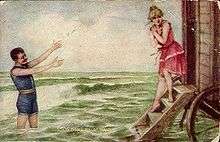
Modest swimming attire in the 1910s
- In an action that made headlines around the world, Dr. Rosalie M. Ladova, a prominent Chicago physician, made an unsuccessful attempt to challenge the American social mores of the time, when she discarded the "bathing skirt" that female swimmers were required to wear in addition to the bloomers that covered their legs. Police arrested Dr. Ladova at the beach at Jackson Park on Lake Michigan and charged her with obscenity.;[67] After seeing the newspaper photographs the next day of Dr. Cordova's blouse and bloomers swimwear, Chicago Mayor Carter Harrison, Jr. declared that "No woman should think of wearing that kind of costume" at a beach, and directed the city police to "gently but firmly insist upon the lady putting on proper costumes".[68] The "skin-tight" bathing suit had long been accepted in Britain for both men and women.[69] After Dr. Ladova's daring experiment, almost eight years would pass before the taboo was discarded in the United States, with Mayor Robert Crissye of the city of Somers Point, New Jersey, inviting women "to bathe on his city's beaches barelegged and in a one-piece suit", in the style of Australian swimmer Annette Kellerman.[70]
July 28, 1913 (Monday)
- Bulgaria and Romania signed a peace treaty in Bucharest, with Bulgaria ceding its territory in Southern Dobruja in return for Romania withdrawing its troops.[16]
- The United States tennis team defeated Great Britain in the finals of the Davis Cup, held at Wimbledon. "[71]
- The trial of Jewish factory manager Leo Frank, on charges of the murder of Mary Phagan, began in Atlanta. Because of the heat, the windows in the Fulton County courthouse were kept open, giving the opportunity for the mob outside to influence the trial's outcome, although the U.S. Supreme Court would later rule, in 1915, that Frank's due process rights had not been prejudiced by the circumstances.[72]
- Born: Laird Cregar, American actor, in Philadelphia (d. 1944)
July 29, 1913 (Tuesday)
- At a conference of the ambassadors to Britain of the six "Great Powers" (Austria-Hungary, France, Germany, Italy, Russia, the United Kingdom), in London, it was agreed that an international commission would govern Albania until a monarch could be chosen, and boundaries were set for the new nation. The seven-member International Control Commission, composed of one representative each from each of the Great Powers, and Albania, was to govern Albania for ten years. In March, Prince Wilhelm zu Wied would be selected as King of Albania under the ICC's authority, but the Commission dissolved after its members went to war against each other.[73]
- The Anglo-Ottoman Convention of 1913 was signed between the British and Ottoman Empires, as the "Convention relating to the Persian Gulf and surrounding territories". However, the convention was never ratified, and became a moot point in 1914 when World War One began.[74]
- Born: Erich Priebke, German war criminal and leader of the 1944 Ardeatine massacre of 335 civilians; in Hennigsdorf (d. 2013)
- Died: Tobias Asser, 75, Dutch lawyer, winner of 1911 Nobel Peace Prize
July 30, 1913 (Wednesday)
- Seven spectators at a motorcycle race in Cincinnati, were killed, and 18 seriously injured. Odin Johnson lost control of his cycle while competing at the Lagoon Motordrome and crashed into a light pole, showering 35 people with flaming gasoline.[75]
- As a bloody battle between Bulgarian and Greek troops took place at Djuma, south of Sofia, representatives of Bulgaria, Serbia, Greece, Romania and Montenegro agreed to an armistice in a meeting at Bucharest.[76]
- Britain announced that it would not participate in the 1915 Panama-Pacific Exposition at San Francisco, and was followed within the next two days by Germany and Russia. ("it is regarded as Great Britain's way of intimating that she still resents the course of the United States in regard to the canal tolls" [77]
- Born: Lou Darvas, American cartoonist, in Cleveland (d. 1987)
July 31, 1913 (Thursday)
- In the largest demonstration in for women's suffrage in the United States up to that time, a motorcade of sixty automobiles travelled from Hyattsville, Maryland to the United States Capitol to present the U.S. Senate with petitions bearing 200,000 signatures of persons favoring an amendment to the U.S. Constitution to allow women to vote.[78] On May 9, 1915, petitions with 500,000 signatures would be presented, and on October 27, 1917, one million.[79]
- The Second Opium Conference was convened, at The Hague, in order to take up the matter of the remaining 12 of 46 nations that had not signed. The Conference would end after eight days.[80]
References
- ↑ David W. Blight, Race and Reunion: The Civil War in American Memory (Harvard University Press, 2001) pp6-15
- ↑ "Old Soldiers Defy Gettysburg Heat", New York Times, July 2, 1913
- ↑ "Gettysburg Cold to Wilson's Speech", New York Times, July 5, 1913
- ↑ "Gettysburg Camp Closed", New York Times, July 7, 1913
- 1 2 3 4 5 6 7 "Record of Current Events", The American Monthly Review of Reviews (July 1913), pp36-39
- ↑ "Stefansson Off for Nome", New York Times, July 2, 1913
- ↑ "Everyday Uses of the Metric System", by Fred Telford, in Popular Mechanics (December 1913) p845
- ↑ J. D. Weeks, Postcard History Series: Panama City (Arcadia Publishing, 2005) p7
- ↑ "Lamar Lays Bare His U.P. Tricks— Boastingly Reveals to Lobby Committee His Campaign of Telephone Intrigue", New York Times, July 3, 1913; "Lamar's Story in Detail", New York Times, July 3, 1913
- ↑ "Cannot Reach Lamar", New York Times, July 9, 1913
- ↑ "Can Lamar Be Punished?", New York Times, July 4, 1913
- ↑ "City Seizes Ice Plants", New York Times, July 3, 1913
- ↑ "Cincinnati Ice Strike Settled", New York Times, July 7, 1913
- ↑ "Old Whaler Starts for Crocker Land", New York Times, July 3, 1913
- ↑ Albert A. Nofi, A Civil War Treasury (Da Capo Press, 1995) p396
- 1 2 Călin Hentea, Brief Romanian Military History (Scarecrow Press, 2007) pp118-119
- ↑ "M'Loughlin Loses Challenge Match", New York Times, July 5, 1913
- ↑ "150 Russian Peasants Burned", New York Times, July 5, 1913
- ↑ "German War Minister Resigns", New York Times, July 5, 1913; "New German War Minister", New York Times, July 8, 1913
- ↑ "H. C. Knight, Daring Auto Racer, Killed", New York Times, July 5, 1913
- ↑ "40 Rioters Killed, Rand Strike Ended", New York Times, July 6, 1913
- ↑ Philip A. Klinkner and Rogers M. Smith, The Unsteady March: The Rise and Decline of Racial Equality in America (University of Chicago Press, 2002) p110
- ↑ Pamela Brooks, Heroes, Villains and Victims of Norwich (DB Publishing, 2008) p22
- ↑ "Majority of 109 for Home Rule", New York Times, July 8, 1913
- ↑ Jan Harold Brunvand, ed., American Folklore: An Encyclopedia (Taylor & Francis, 1996) p340
- ↑ Henri F. Ellenberger, The Discovery of the Unconscious: The History and Evolution of Dynamic Psychiatry (Basic Books, 1970) p163
- ↑ "Railroads Will Not Yield to Trainmen", New York Times, July 9, 1913
- ↑ "World Meteorological Organization World Weather/Climate Extremes Archive". Archived from the original on 4 January 2013. Retrieved 10 January 2013.
- ↑ El Fadli, KI; et al. (September 2012). "World Meteorological Organization Assessment of the Purported World Record 58°C Temperature Extreme at El Azizia, Libya (13 September 1922)". Bulletin of the American Meteorological Society. 94 (2): 199. Bibcode:2013BAMS...94..199E. doi:10.1175/BAMS-D-12-00093.1.
- ↑ "Dies a Martyr to X-ray", New York Times, July 11, 1913
- ↑ Richard F. Hamilton, Holger H. Herwig, The Origins of World War I (Cambridge University Press, 2003) p395
- ↑ John K. Fairbank and Denis Twitchett, The Cambridge History of China, Volume 12, Republican China, 1912–1949 (Cambridge University Press, 1983) p233
- ↑ J. A. S. Grenville, The Major International Treaties of the Twentieth Century, Volume 1 (Taylor & Francis, 2001) p50
- ↑ Jürgen Neffe, Einstein: A Biography (Macmillan, 2007) pp163-164
- ↑ Norman Renouf and Kathy Renouf, The Carolinas & the Georgia Coast (Hunter Publishing, 2000) p14
- ↑ http://www.bethelhistorical.org/exhibits.html
- ↑ Michael J. Shapiro, The New Violent Cartography: Geo-Analysis After the Aesthetic Turn (Routledge, 2012) p108
- ↑ "Paris-to-Berlin Flight", New York Times, July 14, 1913
- ↑ "Arbitration Bill Made Law in Haste", New York Times, July 16, 1913
- ↑ James M. Cannon, Time and Chance: Gerald Ford's Appointment With History (University of Michigan Press, 1998) p4
- ↑ "Mondragón Aguirre, Magdalena", in The Columbia Encyclopedia of Modern Drama, Gabrielle H. Cody, ed. (Columbia University Press, 2007) p918
- ↑ "To Abolish the Lords", New York Times, July 17, 1913
- ↑ Ian Lustick, Unsettled States, Disputed Lands: Britain and Ireland, France and Algeria, Israel and the West Bank-Gaza (Cornell University Press, 1993) p498
- ↑ "Dr. Robert Bridges New Poet Laureate", New York Times, July 18, 1913
- 1 2 Sasha Su-Ling Welland, A Thousand Miles of Dreams: The Journeys of Two Chinese Sisters (Rowman & Littlefield, 2007) p108
- ↑ "Names Mediation Board", New York Times, July 18, 1913
- 1 2 3 "Record of Current Events", The American Monthly Review of Reviews (August 1913), pp297-298
- ↑ "Rumanians Near Sofia— King Ferdiand Pleads with King Charles for Terms of Peace", New York Times, July 18, 1913; Robert W. Seton-Watson, A History of the Roumanians (Cambridge University Press, 1934) p459
- ↑ "French Army Bill Passed", New York Times, July 20, 1913
- ↑ Patrick McDonagh, Idiocy: A Cultural History (Liverpool University Press, 2008) pp326-327
- ↑ "Canton Governor Rebels", New York Times, July 20, 1913
- ↑ Edward S. Kaplan, U.S. Imperialism in Latin America: Bryan's Challenges and Contributions, 1900–1920 (Greenwood Publishing Group, 1998) p42
- ↑ Joyce A. Madancy, The Troublesome Legacy of Commissioner Lin: The Opium Trade and Opium Suppression in Fujian Province, 1820s to 1920s (Harvard University Asia Center, 2003) p224
- ↑ "Turkey's Advance Scares Powers", New York Times, July 24, 1913
- ↑ Handan Nezir-Akmese, The Birth of Modern Turkey: The Ottoman Military and the March to World War I (I.B.Tauris, 2005) p140
- ↑ Hui-Min Lo, ed., The Correspondence of G. E. Morrison 1912–1920 (Cambridge University Press, 1978) p200
- ↑ "Nellie Hall", in The Women's Suffrage Movement: A Reference Guide, 1866–1928, Elizabeth Crawford, ed. (UCL Press, 1999) pp373-374
- ↑ "50 Girls Die in a 20-Minute Factory Blaze", New York Times, July 23, 1913
- ↑ "Block Welsh Church Bill", New York Times, July 23, 1913
- ↑ Andrew E. Kersten, Clarence Darrow: American Iconoclast (Macmillan, 2011) pp171-172
- ↑ Bobby Bridger, Buffalo Bill and Sitting Bull: Inventing the Wild West (University of Texas Press, 2002) pp9-10
- ↑ "Thrown out by Lords- Another Government Bill, That to Abolish Plural Voting, Defeated", New York Times, July 25, 1913
- ↑ Christopher H. Sterling, et al., Shaping American Telecommunications: A History of Technology, Policy, And Economics (Taylor & Francis, 2006) pp80-81
- ↑ "Austria Demands End of Bloodshed- Warns Servians and Greeks That Mercy Must Be Shown Bulgaria", New York Times, July 26, 1913
- ↑ Lyon Sharman, Sun Yat-Sen, His Life & Its Meaning: A Critical Biography (Stanford University Press, 1968) p186
- ↑ Seán McConville, Irish Political Prisoners, 1848–1922: Theatres of War (Routledge, 2003) p415
- ↑ "Arrest Skirtless Bather", New York Times, July 28, 1913
- ↑ "Bloomers Shock Chicago" New York Times, July 29, 1913
- ↑ "Laugh At our Austerity — English People's Comment on the Great Bathing Suit Question", New York Times, July 30, 1913
- ↑ Tim Dahlberg, et al., America's Girl: The Incredible Story of How Swimmer Gertrude Ederle Changed the Nation (Macmillan, 2009) pp 47-49
- ↑ America Regains Davis Tennis Cup", New York Times, July 29, 1913
- ↑ "Frank, Leo, Case of", in The Oxford Companion to American Law, Kermit L. Hall, et al., eds (Oxford University Press, May 2, 2002) p322
- ↑ "International Control Commission (1913)", in Historical Dictionary of Albania, Robert Elsie, ed. (Scarecrow Press, 2010) p200
- ↑ H. Rahman, The Making of the Gulf War: Origins of Kuwait's Long-Standing Territorial Dispute With Iraq (Garnet & Ithaca Press, 1997) p53
- ↑ "Cycle Crash Killed Eight", New York Times, August 1, 1913
- ↑ "Arrange Balkan Armistice", New York Times, July 31, 1913; J. A. S. Grenville, The Major International Treaties of the Twentieth Century: A History and Guide with Texts, Volume 1 (Taylor & Francis, 2001) p50
- ↑ "England to Ignore the Panama Fair", New York Times, July 31, 1913
- ↑ "Suffrage Autoists Besiege Senators", New York Times, August 1, 1913
- ↑ Susan Zaeske, Signatures of Citizenship: Petitioning, Antislavery, & Women's Political Identity (University of North Carolina Press, 2003) p183
- ↑ David F. Musto, The American Disease : Origins of Narcotic Control (Oxford University Press, 1999) pp52-53
This article is issued from
Wikipedia.
The text is licensed under Creative Commons - Attribution - Sharealike.
Additional terms may apply for the media files.